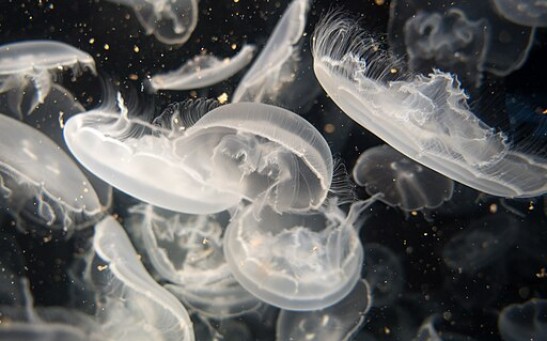jellyfish

Biohybrid Robots Based on Jellyfish Designed to Gather Climate Science Data From Depths of the Oceans

MSM126 Mission: International Expedition Embarks to Explore Deep-Sea Habitats Around Madeira

Jellyfish Extracellular Matrix Could Be Used To Develop Humanlike Organs, Tissues in Laboratory Settings
![Helmet Jellyfish 'Highly Sensitive' To Plumes of Sediment From Seabed Mining [Study]](https://1721181113.rsc.cdn77.org/data/images/full/50311/helmet-jellyfish-highly-sensitive-to-plumes-of-sediment-from-seabed-mining-study.jpeg?w=237&h=131)
Helmet Jellyfish ‘Highly Sensitive’ to Plumes of Sediment From Seabed Mining [Study]

Jellyfish Can Learn Even Without Brain, Implying Adaptation in Creatures with Few Neurons and Environmental Awareness

Vinegar Helps 5-Year-Old Boy Survive After Being Stung by Extremely Venomous Jellyfish

Newly Discovered Box Jellyfish Species in Hong Kong Highlights Rich Diversity of Marine Life in Chinese Waters

Jellyfish Jamboree: Hundreds of Squishy, Gelatinous Creatures Washed Up on North Carolina Island

Rare Jellyfish Filmed Off the Coast of Papua New Guinea Could Be a New Species
Millions of Dead Sailor Jellyfish All Over the World, ‘the Blob’ Could Be Blamed for It

Invasive Jellyfish Cause Serious Damage to Marine Ecosystems

[Video] 'UFO Jellyfish' From Outer Space Seen In Samoa, Space Aliens Could Look Like Jellyfish?

Jellies Reveal Clever Mode of Transport, Even in Absence of Brains

VIDEO—Jellyfish Reveal A Knack for Global Positioning & Swimming in New Study
Most Popular

How Technology Is Changing the Real Estate Industry?

How a Plant-Based Diet Can Protect Against Breast Cancer: Insights from Nutrition Research

Study Reveals High Turnover in Scientific Research Careers: What This Means for Future Scientists

Why It's So Difficult to Lose Weight: The Biological Explanation Behind Obesity






